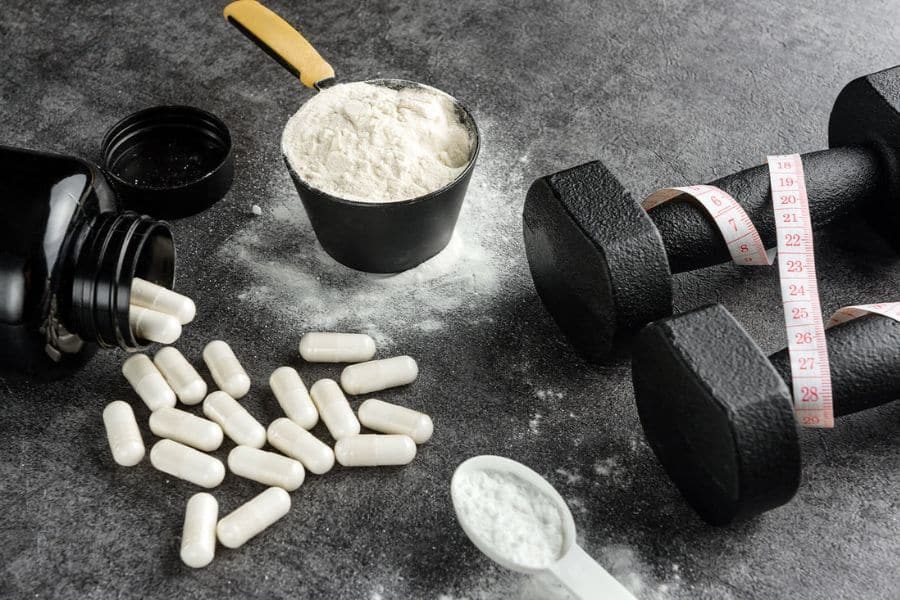Understanding Creatine
Introduction to Creatine
Creatine is like the body’s little energy booster—hanging out mainly in your muscle cells. Think of it as your internal battery charger, especially when you’re pushing yourself during intense exercise. You get about half of your creatine from munching on meat and fish; the rest is made in your liver, kidneys, and pancreas. Curious about creatine’s inner workings? We’ve got you covered with our deep dive on what is creatine.
Role of Creatine in Energy Production
The magic of creatine lies in how it cranks up your energy cells by topping off adenosine triphosphate (ATP)—the fuel for all your cells, kind of like how gas fuels a car. When you exercise hard, ATP transforms into adenosine diphosphate (ADP), releasing energy. And here comes creatine to save the day, turning ADP back into ATP by sharing its high-energy phosphate groups with it, making sure you never run out of juice. This is especially key if you’re an athlete sprinting or hitting it hard at the gym (Healthline).
| Source of Creatine | Contribution to Body’s Creatine |
|---|---|
| Diet (meat, fish) | 50% |
| Made in Body (liver, kidneys, pancreas) | 50% |
Creatine gives you that oomph for fast, explosive movements. It’s like a secret weapon for activities that require a quick surge of energy. Think of it as giving your fast-twitch muscles a head start, helping you jump higher, lift heavier, and sprint faster without feeling worn out too quickly.
If boosting your performance without slowing down your stamina is on your agenda, creatine is worth considering. It not only pumps up your power but also encourages your muscles to store more glycogen, meaning more instant energy when you’re in crunch time.
Looking for more on how creatine can power up your workouts? Check out our pieces on benefits of creatine and get the lowdown on how much creatine you should take.
Effects of Creatine on Exercise Performance
Performance Enhancement in High-Intensity Exercise
Creatine might just be your new best pal if you’re looking to crank it up a notch during high-intensity workouts. It’s like topping off your energy levels, giving you more adenosine triphosphate (ATP) in your muscles to play with. This little boost can amp up your performance by a whopping 15%, turning your sprints and swims into personal bests. It’s like the secret sauce for activities needing those quick, energetic bursts.
| Exercise Type | Performance Improvement |
|---|---|
| Sprinting | Up to 15% |
| Swimming | Faster sprint speeds |
| Cycling | Improved power output |
Curious about how creatine works its magic? Check out our article on what is creatine.
Benefits for Strength-Based Activities
Creatine doesn’t stop at just high intensity; it’s also a powerhouse for boosting strength. Studies show that taking creatine can fire up your max strength during moves like the squat and bench press. It’s also known to spice up your explosive power, which can help with jumps and lifts. Imagine being able to lift more and jump higher—sounds like a win.
| Strength Activity | Improvement |
|---|---|
| Maximum Squat | Increased strength |
| Bench Press | More reps |
| Explosive Jumps | Enhanced power |
This extra strength isn’t just theoretical. Take college football players; they’ve seen some slick improvements on the field with creatine. Don’t take it from me—peep our insights on the benefits of creatine.
Impact on Endurance Exercise
Now, when it comes to endurance, creatine’s role is a bit more complex. It’s not just about short bursts; it’s helpful in the long game too. By reducing muscle damage and helping you bounce back quicker, creatine might just shorten your downtime after intense sessions. This is a big deal for athletes who are all about the long haul.
While it shines brightest in high-octane, strength-centric workouts, creatine’s also got your back in endurance, aiding faster recovery and easing muscle wear and tear.
Looking to slot creatine into your routine? Check our handbooks on when to take creatine and creatine dosage recommendations. And for those focused on gains, our creatine for muscle growth article lays it all out.
Mechanism of Creatine Action
ATP Replenishment by Creatine
Creatine’s big job is cranking up energy production in your cells. It keeps ATP, your body’s energy jackpot, topped up. This means you can push harder and longer during those tough workouts (Healthline). ATP, or adenosine triphosphate, is kind of like the gas for your body’s engine, especially when you’re getting your sweat on.
Here’s the scoop: as you huff and puff, your muscles burn through ATP super fast, tanking its levels. This is where creatine rolls in, storing up high-energy phosphate groups. It turns ADP (adenosine diphosphate) back into ATP, so you’re not running on fumes.
Muscle Energy Production
Creatine is like a loyal sidekick to your skeletal muscles, ensuring a steady power supply while you’re breaking a sweat (Cleveland Clinic). Your body gets about half of its creatine from munching on creatine-rich foods, while your insides (liver, kidneys, pancreas) whip up the rest.
During your training, creatine is the MVP in fast-twitch muscle fibers, acting as a savior to keep ATP production buzzing and stave off fatigue. You might notice you can train harder and bounce back quicker.
Creatine in Muscle Growth
Creatine pulls another trick from its hat for muscle growth. It’s a key player in converting itself into a compound that powers up your muscles during hardcore exercise (Cleveland Clinic). With more ATP in the tank, you can hit the weights harder and bulk up more effectively.
Rumor has it creatine might also give your brain some extra juice, which could help with things like memory. For more juicy details on how creatine helps you bulk up, check out our piece on creatine for muscle growth.
| Mechanism | Role |
|---|---|
| ATP Replenishment | Boosts energy by turning ADP back into ATP (Healthline) |
| Muscle Energy Production | Powers up skeletal muscles by keeping ATP levels steady (Cleveland Clinic) |
| Muscle Growth | Helps produce energy during tough exercise and supports muscle growth (Cleveland Clinic) |
Find out more about the perks of creatine and how you can add it to your workouts. Don’t forget to peep the creatine dosage recommendations to use it safely and effectively.
Creatine Supplementation
Benefits of Creatine Supplements
If you’re looking to up your game in the gym, creatine might just be your new best friend. Popping those creatine supplements regularly can jack up the creatine levels in your cells, helping you perform better. Here’s what you might notice:
- Lift Heavier: Feel the burn as you crank out extra reps or boost your max weight.
- Power Boost: Great for when you need that quick burst of energy, like when sprinting or doing high-powered exercises.
- Sprint Like a Champ: Ideal when you’re going all-in during short but intense activities.
- Muscle Without the Fat: Helps build muscle mass while keeping the extra weight at bay.
Dosage Recommendations
Aim to take 3 to 5 grams of creatine a day. More than that? Nah, it’s like pouring extra gas into a full tank—it doesn’t do much good. Plus, overdoing it might mess with your kidneys.
| Dosage Level | Effectiveness | Safety |
|---|---|---|
| 3 – 5 grams daily | Spot On | Safe for most folks |
| More than 5 grams daily | No extra perks | Might bug your kidneys |
Need more scoop on dosing? Check out our creatine dosage recommendations.
Safety and Potential Risks
Creatine is pretty chill for most people, but there are a few things to keep in mind:
- Liver and Kidney Check: There’ve been tiny tweaks in liver and kidney tests, but nothing massive to worry about.
- Kidney Heads-Up: Got kidney issues? Give your doc a shout before diving in.
For the lowdown on possible risks and whatnot, swing by our creatine side effects page.
Learn more about the benefits of creatine, ways to use it safely, and whether it’s right for your goals and health vibes.
Research Insights on Creatine
Studies on Creatine and Athletic Performance
Turns out, creatine is a superstar in the supplement universe, particularly if you’re all about that high-intensity workout life. Over 70% of studies give creatine a hearty thumbs-up, showing no negative vibes (Healthline). Instead of slogging away for months to see gains, creatine promises improvements from 1% up to a whopping 15%.
| Study | Performance Boost |
|---|---|
| Sports like soccer and swimming | Sprint speeds climbed up to 15% |
| Intense workouts like cycling and running | Performance bumped up 1–15% |
| (Source: Healthline) |
Creatine’s got your back if you’re into pumping iron or sprinting to beat your last workout, helping to up your game and cut down recovery time. Want to dive deeper into what creatine can do? Check out our article on creatine monohydrate benefits.
Effects on Muscle Growth
If you’re aiming to pack on some muscle, creatine might just be your new best friend. For folks between 18 and 30, adding creatine to your weightlifting regimen can help boost muscle growth, but we’re still figuring out how it plays out for older folks or those with muscle-related conditions.
| Duration | Muscle Mass Gain |
|---|---|
| 4 to 12 weeks with regular workouts | Gain an extra 2 to 4 pounds |
| (Source: Cleveland Clinic) |
In just a month or three of hitting the gym, creatine users can stack on a couple more pounds of muscle compared to those skipping out. For the full lowdown, head over to our page on creatine for muscle growth.
Creatine Benefits for Other Conditions
Creatine isn’t just for jocks hitting the gym — it’s been tested for some pretty serious health conditions too. There have been studies checking out how creatine could help folks with Chronic Obstructive Pulmonary Disease (COPD) during rehab.
Knowing the ins and outs of creatine’s capabilities can help you see its real-world magic. For more scoop on how to use creatine and find the right dosage, swing by our guide on creatine dosage recommendations.










